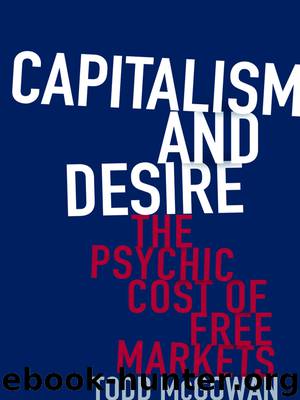Capitalism and Desire by McGowan Todd;

Author:McGowan, Todd;
Language: eng
Format: epub
Tags: PHI019000, PHILOSOPHY/Political, PHI040000, PHILOSOPHY/Movements/Critical Theory
Publisher: Columbia University Press
Published: 2016-09-19T16:00:00+00:00
FAKING THE LIMIT
Other attempts to erect barriers to the expansion of capitalism inevitably run into the same problem that besets environmentalism. The barriers do not deter but rather inspire the process of commodification. Michal Sandel’s What Money Can’t Buy: The Moral Limits of Markets and Debra Satz’s Why Some Things Should Not Be for Sale both lament this increasing commodification and propose that we set limits on it. Sandel claims that we are now witnessing “the growing reach of money and markets into spheres of life once governed by nonmarket norms.”28 Sandel is particularly upset about the intrusion of advertising into the sports arena, but he also documents the introduction of private inequalities into formerly public domains, like highway lanes in which one can pay extra for the privilege of using. Sandel wants to introduce some finitude into capitalism’s infinite expansion, and he argues for this position on the basis of moral grounds. As he sees it, the claims of the market should not decide every question. Some things are priceless.
But there is really nothing to separate Sandel’s position from that of MasterCard. In its very successful advertising campaign touting the ability of MasterCard to pay for almost everything, the company admits that there are some objects that have no price. Perhaps the most famous of these commercials depicts an elephant assembling a care package for his ailing keeper. The elephant takes a MasterCard to various stores, and as he purchases the supplies, a voiceover announces their cost. The voiceover says, “Hot soup: $4. Cold medicine: $11. Tissues: $1. Blanket: $24. Making it all better: priceless.” Just like Sandel, MasterCard is perfectly willing to grant that some elements of life cannot be figured in terms of the market. The company doesn’t just use the fantasy of a terrain outside the market to sell their product. Capitalism actually requires this barrier in order to constitute itself as infinitely expanding. What is priceless today, one can be sure, will have a price tomorrow, when something else will miraculously become priceless.
The link between Michael Sandel and MasterCard becomes even clearer when one moves beyond What Money Can’t Buy and examines Sandel’s involvement in massive open online courses (MOOCs). These courses represent an unprecedented expansion of capitalism into the university system and have the potential to unleash widespread privatization of higher education while transforming the majority of professors into the equivalent of glorified teaching assistants for a few luminaries like Sandel himself. For this reason, numerous other philosophers have directed sharp criticisms at Sandel. We should not see this as an inconsistency on Sandel’s part, but as a logical outgrowth of his attempt to set external limits on capitalism. It is just that in this case Sandel is the proponent both of the limit and the expansion beyond the limit. He stands for finitude in his book and the bad infinite in his teaching practice, and he illustrates nicely how compatible the two are.
As Anna Kornbluh points out, the attempt to limit capitalism testifies
Download
This site does not store any files on its server. We only index and link to content provided by other sites. Please contact the content providers to delete copyright contents if any and email us, we'll remove relevant links or contents immediately.
The remains of the day by Kazuo Ishiguro(7551)
Tools of Titans by Timothy Ferriss(6947)
The Black Swan by Nassim Nicholas Taleb(6191)
Inner Engineering: A Yogi's Guide to Joy by Sadhguru(5897)
Giovanni's Room by James Baldwin(5878)
The Way of Zen by Alan W. Watts(5800)
The Six Wives Of Henry VIII (WOMEN IN HISTORY) by Fraser Antonia(4790)
The Power of Now: A Guide to Spiritual Enlightenment by Eckhart Tolle(4755)
Astrophysics for People in a Hurry by Neil DeGrasse Tyson(4620)
Asking the Right Questions: A Guide to Critical Thinking by M. Neil Browne & Stuart M. Keeley(4574)
12 Rules for Life by Jordan B. Peterson(3734)
The Ethical Slut by Janet W. Hardy(3503)
Skin in the Game by Nassim Nicholas Taleb(3460)
Housekeeping by Marilynne Robinson(3401)
The Art of Happiness by The Dalai Lama(3384)
Double Down (Diary of a Wimpy Kid Book 11) by Jeff Kinney(3272)
Skin in the Game: Hidden Asymmetries in Daily Life by Nassim Nicholas Taleb(3264)
Walking by Henry David Thoreau(3234)
12 Rules for Life: An Antidote to Chaos by Jordan B. Peterson(3200)
